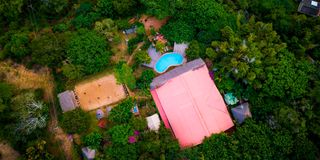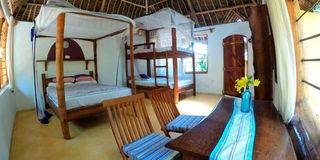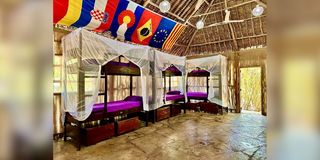Premium
Backpackers’ hostels: Where low-budget travellers meet

An aerial view of Distant Relatives Ecolodge & Backpackers.
What you need to know:
- The fun is in swimming in a public beach and eating street food or cooking own meals while spending less on accommodation.
- Two establishments in the coast are leading this trend. They are the Diani Backpackers and the Distant Relatives Ecolodge and Backpackers.
Cost-conscious young travellers, who have no qualms about sharing rooms with strangers while on vacation are boosting revenues of backpacker hotels, especially in Mombasa, Diani and Malindi.
The daring millennials and Gen Zs are trading down from expensive hotels or Airbnbs to stay in hostels with dormitories that have bunk beds, shared by both men and women.
The bunk beds are set in a large room with shared bathrooms and toilets. As the name suggests, the backpackers pack light, which allows them to move around to experience destinations.
The fun is in swimming in a public beach and eating street food or cooking own meals while spending less on accommodation.

A cabana next to the swimming pool at Diani Backpackers.
Two establishments in the coast are leading this trend. They are the Diani Backpackers and the Distant Relatives Ecolodge and Backpackers.
Mark Alexander, the owner of Diani Backpacker, says he founded the hostel in 2018. Then, it was only a place that offered cheap accommodation. The backpackers came, slept and sought fun outside the hostel. Now, Mark has added party, game and movie nights.
“When I was a backpacker, I liked to go to lively places and get immersed in the culture of the country I was visiting. There were hostels where you could party, drink, and eat all under the same roof. So, I turned the hostel into something similar, because that was what I liked back in the day,” he says.
Affordability being a key concern among young travellers, he has been able to attract thousands of solo travellers from all over the world.
The hostel exudes a very laid-back kind of lifestyle with small bandas by the pool where you will find people lounging, either sipping drinks from the bar or eating a sandwich from the kitchen.
At night, it comes alive with a DJ playing at the makeshift club with a sandy floor and neon lights, especially on Wednesdays, Fridays, and Saturdays. Guests are allowed to take a dip in the pool at any time, unlike regular hotels that close pools at night.
“Last year, we had people from 95 different countries stay with us. Seventy percent of our guests are international while 30 percent are locals. It could be more, but Kenyans are a little apprehensive about sleeping in a mixed dormitory, boys and girls together. But when they try it out because it is the only option that would fit into their budget, they end up loving it. After the pandemic, the Kenyan clientele has been growing steadily. Before that, 95 percent of the clients were foreigners,” he says.
The hostel has 71 beds.

One of the family ‘bandas’ with bunk beds in Distant Relatives Ecolodge & Backpackers.
Most of the backpackers’ hostels in Kenya charge from Sh1,500 to Sh6,000, depending on whether a person books a dorm or a private room.
Then there is a group that stays at the hostels free of charge.
These are volunteers who keep the party mood going, Mr Alexander says. They plan sunset trips such as boat rides to the Kongo River or a hike on the Shimba Hills. They also engage guests in games, karaoke and movie nights They are also tasked with posting lively content on the hostel’s Instagram page with over 17,000 followers.
“They get free accommodation, which is a bed in one of the dorms and a free meal. Their stays last between three weeks to three months,” he says.
Volunteering at hostels is typical behaviour of solo backpackers since they are moving from one country to another exploring, and they need to save costs on accommodation to pay for expensive flight tickets.
In October, Saturday magazine met India, a German volunteer at Diani Backpackers. India said she started volunteering in Uganda and then ended up in Kenya.
“In Germany, it is pretty common to do a gap year or to go travelling or volunteering. During my travels, I met many people of different ages who are doing backpacking since it is a cheap way to travel and to meet many new people,” she says.
Mwanase Ahmed, the managing director of Distant Relatives Ecolodge and Backpackers in Kilifi, agrees that the hostel attracts a good number of solo travellers similar to Diani Backpackers.

Inside one of the dormitories in Diani Backpackers.
“Distant Relatives is a space where all people can come and feel welcome, hence the name. It is also an eco-lodge. We do rainwater harvesting, composting toilets in some of the rooms, and reusing our water,” Ms Ahmed says.
For those who prefer spending their time giving back to nature, this hostel has a fruit forest where guests can plant mango trees. You can also participate in beach clean-ups.
An interesting feature at Distant Relatives is the community kitchen where guests travelling on a budget to cook their meals.
“Another common feature of backpacker hostels is having a common area which is a nice space for extroverts and introverts to socialise. It is unlike hotels where you only have the reception and a block of rooms. Most backpacker hostels also have activities such as game and movie nights. We also have performances on Friday nights where we have hosted artistes such as Nazizi and Jua Cali,” she says.





